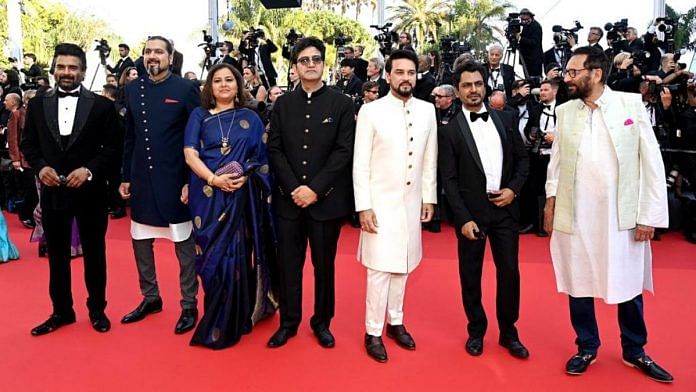New Delhi: India is the first ‘country of honour’ at the Marche du Cinema, the business counterpart of the Cannes Film Festival whose 75th edition began Tuesday.
India’s heightened status at one of the world’s largest film markets is also a tribute to the country’s 75 years of diplomatic relations with France. Movie enthusiasts say Indian cinema and artists this year will immensely benefit from the global exposure that Cannes provides.
Six films – selected by the Ministry of Information and Broadcasting – will be screened at the market this year. They are Nikhil Mahajan’s ‘Godavari’, R Madhavan’s ‘Rocketry The Nambi Effect’, Jayaraj’s ‘Tree Full of Parrots’, Achal Mishra’s ‘Dhuin’, Biswajeet Bora’s ‘Boomba Ride’ and Shankar Shrikumar’s ‘Alpha Beta Gamma’.
These films are not part of the Cannes’ official selection, which will be judged by Indian actor Deepika Padukone as member of the festival’s international jury.
Shaunak Sen’s thought-provoking documentary ‘All That Breathes’, which premiered at Sundance not long ago, is the only official selection this year at Cannes, apart from two restored films – Satyajit Ray’s ‘Pratidwandi’ and G. Aravindan’s ‘Thamp’.
Sen’s documentary sheds light on the pollution in Delhi and how it affects the ecology of the region, especially birds.
India will also showcase five movies at the Olympia cinema under the “Goes to Cannes” section this year. They are Assamese movie ‘Baghjan’ by Jaicheng Zxai Dohutia, ‘Bailadila’ by Shailendra Sahu from Chhattisgarh, ‘Ek Jagah Apni’ in Hindi by Ektara Collective, ‘Follower’ in Marathi by Harshad Nalawde and Kannada film ‘Shivamma’ by Jai Shankar.
ThePrint takes a look at some of India’s milestones at the 75-year-old Cannes film festival.
Also read: One day India won’t be at Cannes, Cannes would be at India: Deepika
The Cannes allure
The marquee festival began in 1946 at the Palais des Festivals et des Congrès, a convention centre in the city of Cannes, situated on the French Riviera.
About 20 films premiere “In Competition” each year, where they compete for the top Cannes prize — the Palme d’Or (“golden palm”).
The winner of the Palme d’Or and of seven other major prizes, including the Grand Prix and the Prix de Jury, are picked by a jury of film industry professionals. Artists like Robert De Niro, Cate Blanchett and Martin Scorsese among others have served on the jury over the years.
Cannes is recognised as the most prestigious film festival in the world, due to its exclusivity and long history of premiering some of the greatest films of all time, like ‘Pulp Fiction’, ‘Taxi Driver’ and Marlon Brando’s ‘Apocalypse Now’.
Cannes carefully cultivates this image by selecting a limited number of films; by giving awards selected by juries of well-known filmmakers, actors, and composers from around the world; and by maintaining the world’s busiest movie market, the Marché du Film.
Movie distributors who specialise in finding ways to get audiences for foreign and other niche films strike the most important deals of the year at the festival. Filmmakers in need of funding and distribution spend their days at the market.
The early pioneers
In 1946, India was represented at Cannes by Chetan Anand’s acclaimed ‘Neecha Nagar’ which shared the top award, Grand Prix du Festival International du Film, with David Lean’s ‘Brief Encounters’.
‘Neecha Nagar’, starring Kamini Kaushal and Zohra Sehgal, was the first Indian film to receive the Grand Prix award, which is now known as the Palme d’Or.
Bimal Roy’s poignant magnum opus ‘Do Bigha Zamin’, starring Balraj Sahni, won the Prix International in 1954. The year 1956 saw the Palme d’Or go to Satyajit Ray’s ‘Pather Panchali’ – a towering film in the history or world cinema.
The Bollywood connection
It was only in 2002 that Bollywood made its Cannes debut with the screening of Sanjay Leela Bhansali’s ‘Devdas’. The following year, Aishwarya Rai became the first Indian woman to be a part of the international jury. Director Mrinal Sen was the first ever from India to have sat on the jury in 1982.
Ever since, Vidya Balan, Nandita Das, Sharmila Tagore, filmmaker Shekhar Kapur and author Arundhati Roy have also served as jury members.
2013 was a breakout year with Amitabh Bachchan opening the festival following his cameo in ‘The Great Gatsby’.
Films like ‘The Lunchbox’, ‘Bombay Talkies’ and ‘Monsoon Shootout’ have also been showcased with ‘The Lunchbox’ winning the Critics Week Viewers Choice awards.
The last Indian film to bag an award was Neeraj Ghaywan’s ‘Masaan’, released in 2015. It received the Promising Future and International Jury of Film Critics prize.
Also read: Three years ago, Masaan brilliantly captured sexuality and aspiration in small town India



